NCRI Reveals: Iranian Regime’s Command Structure Behind Escalating Terrorist Operations in the West, Khamenei's Key Role
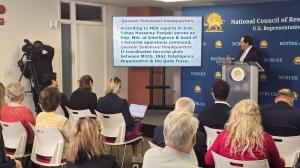
Washington, DC, Aug 7, 2025 - The NCRI reveals the detailed command structure driving the Iranian regime’s overseas terrorist operations, implicating the regime's Supreme Leader, Ali Khamenei, based on intelligence obtained by the MEK network inside Iran.
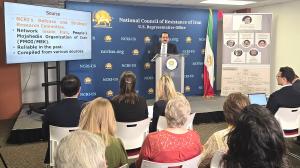
Washington, DC, Aug 7, 2025 - The NCRI reveals the detailed command structure driving the Iranian regime’s overseas terrorist operations, implicating the regime's Supreme Leader, Ali Khamenei, based on intelligence obtained by the MEK network inside Iran.
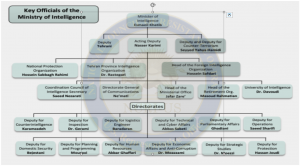
Washington, DC, Aug 7, 2025 - The NCRI shares the org chart of the key officials of Iran regime's Ministry of Intelligence and Security (MOIS), based on intelligence obtained by the MEK network inside Iran.

Washington, DC, Aug 7, 2025 - The NCRI reveals the detailed command structure driving the Iranian regime’s overseas terrorist operations, implicating the regime's Supreme Leader, Ali Khamenei, based on intelligence obtained by the MEK network inside Iran.
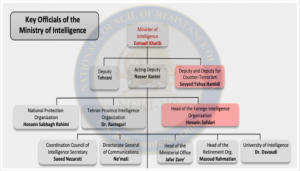
Washington, DC, Aug 7, 2025 - The NCRI shares the names of the key officials of the Iranian regime's Ministry of Intelligence and Security (MOIS), based on intelligence obtained by the MEK network inside Iran.
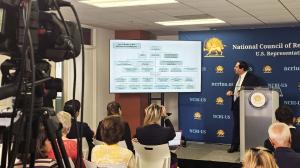
Washington, DC, Aug 7, 2025 - The NCRI reveals the detailed command structure driving the Iranian regime’s overseas terrorist operations, implicating the regime's Supreme Leader, Ali Khamenei, based on intelligence obtained by the MEK network inside Iran.
Embassies, diplomatic missions, and affiliated cultural and religious centers must be closed, their operatives held accountable, and IRGC and MOIS backlisted.
WASHINGTON, DC, UNITED STATES, August 9, 2025 /EINPresswire.com/ -- Key intelligence obtained by Iran's main opposition, the People's Mojahedin Organization of Iran (PMOI), also known as the MEK, has unveiled the detailed command structure driving the Iranian regime’s overseas terrorist operations, implicating the regime's Supreme Leader, Ali Khamenei, in a string of plots and attacks across Europe and the United States.
The revelations, made public on August 7, 2025, at a news conference (https://www.youtube.com/watch?v=8FcqBvGbbls) held by the Washington office of the National Council of Resistance of Iran (NCRI-US), come after 14 European and North American governments jointly condemned Iran’s surging campaign of extraterritorial terrorism, warning of an “unprecedented escalation” of regime-backed plots targeting both dissidents and Western officials.
According to documents and operational charts obtained by the MEK network inside Iran, at the core of the regime’s covert apparatus is Ali Khamenei, who personally oversees the appointment of intelligence chiefs and gives final approval to high-profile terror operations. Websites linked to his office have issued threats against senior Western officials, underlining the direct role of Iran’s ruling clergy in the orchestration of violence abroad.
Central to these activities is a shadowy entity known as the “Qassem Soleimani Headquarters,” named after the notorious IRGC Quds Force commander. This outfit sits within Iran’s Ministry of Intelligence (MOIS). Commanded by Deputy Minister Seyyed Yahya Hosseiny Panjaki (also known as Seyyed Yahya Hamidi), this HQ coordinates operations between the MOIS, the IRGC Intelligence Organization, and the Quds Force, using the web of its embassies and its operatives-turned-diplomats as operational hubs.
According to the information made available to NCRI, the Soleimani Headquarters not only deploys Iranian operatives but also contracts organized crime syndicates—most notably the so-called “Moroccan mafia” and the macro-mafia, with links to narcotics trafficking and multiple contract killings, to execute attacks with plausible deniability.
Spanish police investigations confirm that the November 2023 assassination attempt on Professor Alejo Vidal-Quadras, former Vice President of the European Parliament and prominent supporter of the NCRI, was commissioned by this very command structure. The hit was executed by a criminal gang with direct ties to both the IRGC Quds Force and the MOIS, led by fugitive gang boss Sami Bekal Bounouare, now reportedly sheltering in Iran.
Similarly, the failed bombing of the 2018 Free Iran World Summit in Villepinte, near Paris, which targeted Mrs. Maryam Rajavi, the NCRI President-elect, and a number of prominent American and European figures, could have resulted in one of the deadliest terror attacks in recent European history. Senior MOIS official Reza Amiri Moghaddam directed the plot. The operational commander, Vienna-based diplomat Assadollah Assadi, was later sentenced in Belgium to 20 years in prison for transporting explosives to Europe and handing them to sleeper cells. Both Assadi and his MOIS superiors were found to be acting under direct orders from Tehran’s intelligence ministry, in coordination with the Quds Force.
Other plots, such as the failed bombing of the MEK Nowruz celebration in Albania in March 2018, were entirely planned by the Ministry of Intelligence and the IRGC’s Quds Force. The main intelligence and reconnaissance operatives present in Albania were MOIS gents, while the actual bombers were recruited from Turkish and Balkan criminal gangs.
The classified document details the MOIS hierarchy and names several key officials:
• SEYYED YAHYA HOSSEINY PANJAKI (HAMIDI): Deputy Minister of Intelligence and head of the Counterterrorism Directorate; designated by the FBI as commander of terror plots in the U.S. and Europe.
• HOSSEIN SAFDARI: Head of the Foreign Intelligence Organization, overseeing intelligence stations embedded in Iranian embassies worldwide.
• REZA AMIRI MOGHADDAM: Current Iranian Ambassador to Pakistan and a senior MOIS operative, now on the FBI’s most wanted list for his role in the abduction of former FBI agent Robert Levinson and for coordinating multiple terrorist plots in Europe.
These officials, supported by a cadre of intelligence, logistics, cyber, and counterintelligence deputies, manage operations that blend espionage, terror, and organized crime.
It must be noted that the regime’s terrorist reach has expanded in parallel with its increasing vulnerability at home and the weakening of its regional proxies. Iranian state media and clerics have openly called for the assassination of Western leaders, including a recent fatwa issued against U.S. President Donald Trump and reiterated by over 2,000 Iranian clerics on August 1.
The exposure of the Iranian regime’s overseas terrorist structure paints a grim picture of Tehran’s ongoing campaign of violence and intimidation far beyond its borders. The network, directed from the very top, spans ministries, embassies, organized crime, and even the pulpit, aiming to eliminate opponents and sow fear across Europe and North America.
On July 15, the FBI added three Iranian intelligence officials, Reza Amiri Moghaddam, Taghi Daneshvar, and Gholamhossein Mohammadnia, to its Most Wanted list for their roles in the abduction and likely death of former FBI Special Agent Robert Levinson, who disappeared in Iran in 2007. Mohammadnia, who operated as Iran’s ambassador to Albania and as a diplomat at the United Nations, was expelled for terror activities.
The scope and brazenness of Iran’s extraterritorial terrorism have prompted urgent calls for a coordinated response. The Iranian Resistance calls for impactful and decisive measures to counter Tehran's terrorism threat:
1. All embassies, diplomatic missions, and affiliated cultural and religious centers of the regime must be closed.
2. The Ministry of Intelligence and the Islamic Revolutionary Guard Corps (IRGC), which are the regime’s main terrorist arms, should be designated as terrorist entities in Europe and other democratic countries, as has already been done in the United States.
3. All agents and operatives of the Ministry of Intelligence and the IRGC, as well as the regime’s unofficial lobbyists, should be prosecuted, punished, and expelled. These lobbies facilitate terrorist activities.
4. The Iranian regime must be held accountable for over four decades of terrorism. United Nations sanctions and those of member states should be imposed on the Iranian regime as the principal state sponsor of terrorism, and its Supreme Leader, Ali Khamenei.
# # #
--------------------
BACKGROUND
The National Council of Resistance of Iran (NCRI) is a democratic coalition of Iranian opposition organizations and personalities and was founded in Tehran, Iran, in July 1981, as the alternative to the clerical regime, a month after the onset of the nationwide resistance to overthrow the ruling dictatorship.
The NCRI is committed to the affirmation of the people’s sovereignty in a republic founded on universal suffrage and pluralism; gender equality; separation of religion and state and freedom of religions and faiths; freedom of thought, press, and association; support for peace in the Middle East; plan for the autonomy of Iranian nationalities and ethnicities; and the Universal Declaration of Human Rights, as embodied in Mrs. Maryam Rajavi’s 10-Point Plan for Future Iran.
The NCRI would serve as a provisional government led by its President-elect Mrs. Rajavi, and its primary responsibility will be to hold free and fair elections for a national and constituent assembly within six months to ensure the peaceful transition of power to the elected representatives of the Iranian people.
Iran’s largest, most organized opposition group, the People’s Mojahedin Organization of Iran (PMOI), also referred to as the MEK, is the principal member of the NCRI.
For more information:
▶️ NCRI-US: https://www.ncrius.org/
▶️ Maryam Rajavi: https://www.maryam-rajavi.com/en/
▶️ NCRI: https://www.ncr-iran.org/en/news/
▶️ MEK: https://english.mojahedin.org/
--------------------
These materials are being distributed by the National Council of Resistance of Iran-U.S. Representative Office (NCRI-US). Additional information is on file with the Department of Justice, Washington, D.C.
NCRI-US
National Council of Resistance of Iran - US Rep. Office
+1 202-747-7847
email us here
Visit us on social media:
LinkedIn
Bluesky
Instagram
Facebook
YouTube
TikTok
X
Legal Disclaimer:
EIN Presswire provides this news content "as is" without warranty of any kind. We do not accept any responsibility or liability for the accuracy, content, images, videos, licenses, completeness, legality, or reliability of the information contained in this article. If you have any complaints or copyright issues related to this article, kindly contact the author above.
Bounce Online Solidifies Position as One of South Africa's Leading Online DJ Equipment Retailers
One Click SEO Unveils One Click GEO & Aura: Pioneering Brand Visibility in the AI-First Search Economy
Arun Kumar Palathumpattu Thankappan Leads Public Sector Innovation with Amorphic by Cloudwick
Więcej ważnych informacji
 Jedynka Newserii
Jedynka Newserii

 Jedynka Newserii
Jedynka Newserii

Handel

Mercosur to tylko wierzchołek góry lodowej. UE ma ponad 40 umów handlowych, które mogą destabilizować rynek rolny
Umowa handlowa między UE a krajami Mercosur może znacząco zaburzyć konkurencję na rynku rolnym i osłabić pozycję unijnych, w tym polskich, producentów – ostrzegają rolnicy i producenci żywności. Umowie sprzeciwia się część krajów unijnych, które domagają się klauzuli ochronnych oraz limitów importowych. – Problemem jest jednak nie tylko ta konkretna umowa. Chodzi o cały system wolnego handlu, który się kumuluje z dziesiątek innych porozumień – podkreśla Andrzej Gantner, wiceprezes Polskiej Federacji Producentów Żywności.
Firma
Dzięki zdalnej weryfikacji tożsamości z wykorzystaniem AI firmy zminimalizowały liczbę oszustw. Rozwiązania wykorzystuje głównie sektor finansowy

Z najnowszych danych Eurostatu wynika, że w 2024 roku 5,9 proc. polskich firm korzystało z rozwiązań z zakresu sztucznej inteligencji. W 2023 roku był to odsetek na poziomie 3,67 proc. Wciąż jednak jest to wynik poniżej średniej unijnej, która wyniosła 13,48 proc. Jednym z obszarów, który cieszy się coraz większym zainteresowaniem wśród przedsiębiorców, jest weryfikacja tożsamości przez AI, zwłaszcza w takich branżach jak bankowość, ubezpieczenia czy turystyka. Jej zastosowanie ma na celu głównie przeciwdziałać oszustwom i spełniać wymogi regulacyjne.
Prawo
Daniel Obajtek: Własne wydobycie i operacyjne magazyny to filary bezpieczeństwa. Zgoda na magazyny gazu poza krajem to rezygnacja z suwerenności energetycznej

Były prezes Orlenu ostrzega przed zmianami w ustawie o zapasach ropy naftowej, produktów naftowych i gazu ziemnego. Jego zdaniem przygotowana przez rząd nowelizacja tzw. ustawy magazynowej i ujednolicanie unijnej polityki energetycznej to zagrożenie dla bezpieczeństwa energetycznego Polski. W jego opinii tylko silna spółka narodowa, własne wydobycie, krajowe magazyny i zbilansowany miks energetyczny zapewnią Polsce bezpieczeństwo i konkurencyjność.
Partner serwisu
Szkolenia

Akademia Newserii
Akademia Newserii to projekt, w ramach którego najlepsi polscy dziennikarze biznesowi, giełdowi oraz lifestylowi, a także szkoleniowcy z wieloletnim doświadczeniem dzielą się swoją wiedzą nt. pracy z mediami.
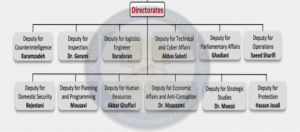
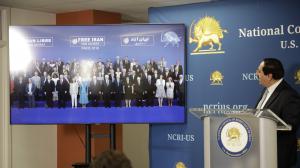




![Nestlé w Polsce podsumowuje wpływ na krajową gospodarkę. Firma wygenerowała 0,6 proc. polskiego PKB [DEPESZA]](https://www.newseria.pl/files/1097841585/fabryka-nesquik_1,w_85,r_png,_small.png)



.gif)

 |
| |
| |
|